Prevention
Tobacco, alcohol, and drug use are major concerns for the health and safety of Maine teens. Everyday youth are exposed to countless messages and pressures that encourage experimentation with deadly substances. Research proves that prevention messages and programs can counteract these influencers and prevent initiation, as well as the numerous health effects and risks of tobacco, alcohol, and drug use.
Why Prevention?
Preventing tobacco, alcohol and drug use in children is critical to the long-term health of our youth, as well as to the overall health of our nation.
Tobacco companies spent millions promoting their deadly products to Maine youth. Exposure to tobacco marketing lures kids into smoking, doubling the odds that they will become tobacco users before the age of 18. The good news is that prevention works. Advocating for prevention has led to a 60% reduction in smoking by Maine high school students since 1996 and the percentage of Maine youth who have never tried smoking is on the increase.
Alcohol is the most used substance among Maine youth. Because alcohol is legal, it is more readily available and adults often model drinking as an acceptable social behavior. Additionally, alcohol marketing seen on TV and other venues can influence youth. The increased exposure not only increases the likelihood that youth will begin drinking, but also the amount they consume. Having open conversations about alcohol laws, modeling responsible behaviors, and discussing risks has shown to help prevent problems that can result from underage drinking.
Marijuana use among Maine youth continues to increase. While Maine moves forward with legalization and regulation, access will also increase. It is important for parents, teachers, and others to understand the harmful effects of marijuana on developing brains and help to prevent initiation, which can also lead to experimentation with other non-legal substances.
With the upsurge in illegal drug experimentation, and misuse of prescription medications there is increased exposure and access to these substances among youth. There continues to be a rise in teen experimentation, use, addiction, and overdose deaths that can be prevented with proper education, awareness, and intervention.
Implementing Policies
Maine law prohibits smoking, alcohol, and drug use in elementary and secondary schools. Schools should also establish and implement comprehensive wellness policies that guide efforts and goals to eliminate tobacco, drug, and alcohol use, as well as create environments that promote health and wellbeing.
A School’s Role
- Forbid tobacco, alcohol, and drug use by students, staff, and visitors on all school grounds and at all school sponsored events
- Provide comprehensive tobacco, alcohol, and drug prevention education programs
- Provide program specific training for teachers
- Involve parents and families in school efforts to prevent tobacco and substance use
- Offer prevention projects and activities for students
- Help students and staff who are using tobacco to quit
- Adopt a firm school policy of not accepting any funding, curricula, or other materials from tobacco companies
- Evaluate the school’s prevention programs at regular intervals
Recreation, Athletics and Schools
Schools are powerful role models for youth with the opportunity to influence their players’ habits around health, sportsmanship, and personal responsibility. School athletic policies that send strong, clear, and consistent tobacco and substance-free messages can prevent youth from experimenting with tobacco and alcohol.
Coaches can discuss the health effects of tobacco and substance use, as well as their impact on sports performance:
Campaigns

Adult use marijuana is legal in Maine. Good to Know Maine is a campaign that raises awareness and educates Mainers on safely, legally and responsibly navigating Maine’s marijuana landscape. The campaign educates on Maine’s laws related to public use, driving and youth as well as safe use and safe storage of marijuana.
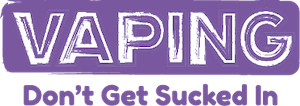
The long-term effects of vaping are still unknown. Don’t be part of an experiment that uses flavors and nicotine to suck you in. Uncover the truth. Don’t get sucked in to the flavor trap. Don’t get sucked in to nicotine, the addictive chemical in e-cigarettes. It’s not a harmless water vapor.
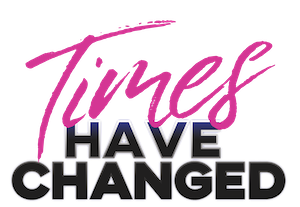
Times have changed! It is a different world. It’s a different time. It’s a new ERA. Times Have Changed provides facts and info for parents/guardians to help them navigate today’s drug and tobacco landscape. Vaping, THC, technology are just a few things that have changed since back in the day. Stay up to date and see how much times have changed.

It can happen here. It is happening. Substance use disorder is affecting our communities, our workplaces, our friends and family. Do what you can to stop it; see something, say something; don’t be quiet. Know that there are resources available – for users and for family members. There are things you can do if you’re taking a prescription medication and there are actions that prescribers can take. There are places to turn for help.
Eyes open to the crisis, eyes open to the possibilities for change, eyes open to our collective future.
If you are 21 or older, you may often enjoy alcohol when socializing with friends and family. Drinking can be harmful, depending on your age, health status, and how much/often you drink.
If you choose to have a drink, here are some simple steps to help you Party Smarter:

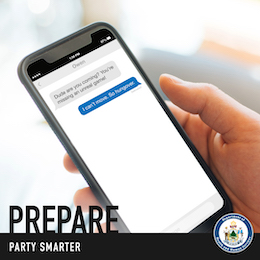
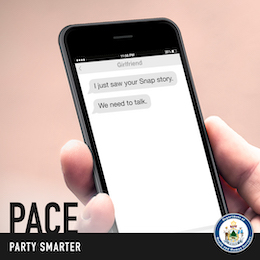
Sometimes the amount you drink can be a signal that you may have a problem with alcohol here are some resources to learn more:
A brief quiz to find out, how much is too much? – Alcohol Screening
Are your drinking habits impacting your health? – Rethinking Drinking
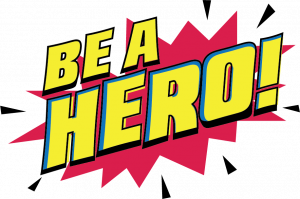
Whether you’re a parent, teacher, grandparent or mentor, you could Be A Hero in a child’s eyes. The campaign, Be A Hero, promotes the importance of building strong relationships with children. Children who have strong bonds with the adults in their lives are less likely to engage in risky behaviors later in life.

Everybody’s not doing – and that’s a fact. The campaign challenges youth to engage in critical thinking skills, identify positive influences, and stand up to negative pressures around substance use. It allows youth to develop an awareness of how they want themselves to be perceived and how their actions might impact how others see them. The campaign empowers their expression and celebrates the importance of making smart choices around all substances.

The tobacco industry has purposely targeted youth with advertising, promotions, samples, movies, and more. If you begin smoking when you are young, you are more likely to become addicted which creates a long-term customer for their deadly products.
They review data about popular trends in music, fashion, and products that appeal to younger audiences. They know youth are highly influenced online and they intend to lure you into thinking smoking is hip and part of your identity.
Unfortunately, it works. Big Tobacco spends more than $42 million each year on targeting Maine youth and one third of youth who experiment with smoking do so because of effective tobacco industry marketing.
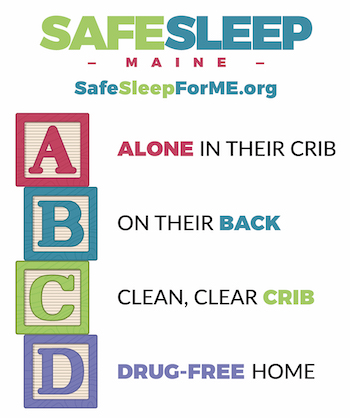
SIDS (Sudden Infant Death Syndrome) is the sudden death of an infant less than one-year-old that cannot be explained after a full investigation. SIDS cannot always be avoided, but there are ways to lower the chances of SIDS by following Safe Sleep practices.
The purpose of the Safe Sleep Maine campaign is to prevent infant deaths by educating the public in ABCD, the four letters associated with the best practices to make sure infants sleep safely. The campaign aims to help inform new and experienced parents, grandparents, and caregivers on the importance of Safe Sleep for babies.
Suicide is the leading cause of violent death in Maine. It doesn’t have to be this way. If you, or someone you know, is dealing with feelings so big that you’re unsure about how to handle it, the Maine Crisis Line is here to listen.
It can be hard to name big feelings.
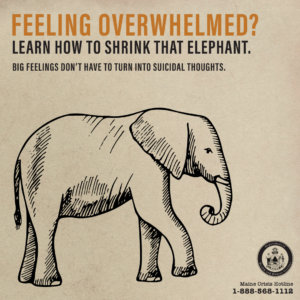
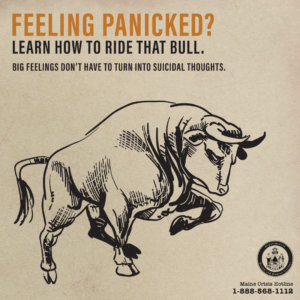
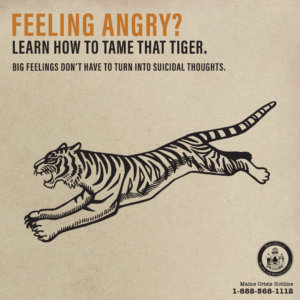
Learning more about what you’re feeling, how to recognize your own warning signs when you feel them, and how to manage them when they appear can help so that these feelings don’t turn into suicidal thoughts. Understanding the warning signs that come with big feelings can help you recognize when you or someone you know may need help. Big feelings look different, and feel different to everyone.
Stress. Anxiety. Boredom. Unrealistic expectations. Do you know what your teen is keeping bottled up inside? When the pressures of everyday life meet the availability of prescription stimulants, your teen may be in harm’s way.
Medications such as Adderall®, Ritalin®, Concerta®, or Dexedrine®, when prescribed by a doctor, can help manage symptoms of ADHD. But some teens are taking stimulants not prescribed to them. The reasons may vary from using as a study aid to avoiding boredom. The most common source of these drugs is their own friends or family members. Talk to your teen about their bottled up feelings and the serious risks of taking medication that isn’t prescribed.
Your guide to drinking alcohol responsibly. Do you know your sipping point? It is the difference between drinking in moderation and drinking to excess. Know the healthy guidelines, legal limit, and your personal habits when it comes to drinking alcohol.
